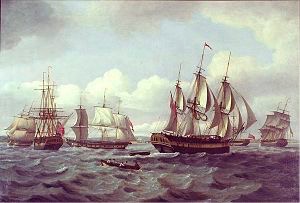A Poem by Liverpool poet Edward Rushton 1756 - 1814.
 The shivering topsails home are sheeted,
The shivering topsails home are sheeted,
And cheerily goes the windlass round;
"Heave, heave, my hearts!" is oft repeated,
And Mary sighs at every sound.
The yellow fever, scattering ruin;
The shipwreck's veteran's dying cries;
And war, the decks with carnage strewing -
All, all before her fancy rise.
As bends the primrose, meek and lowly,
All bruised by April's pelting hail;
So, while the anchor rises slowly,
Poor Mary droops, distress'd and pale.
And oft, while at his handspike toiling,
Full many a glance her seaman steals;
And oft he tries, by gaily smiling,
To hide the parting pang he feels.
 Now through the blocks the wind is howling -
Now through the blocks the wind is howling -
The pilot to the helmsman cries;
And now the bulky ship is rolling,
And now aloft the sea-boy flies.
The whiten'd canvas swift is spreading,
Around the bows the surges foam;
And many a female tear is shedding,
And thoughts prevail for love and home.
Her tar, among the sunburnt faces,
Now Mary views with fond regard;
Now o'er the deck his form she traces -
Now, trembling, sees him on the yard.
Where'er he moves, alert and glowing,
Her beauteous azure eyes pursue -
Those eyes that show, with grief o'erflowing,
Like violets wet with morning dew.
 Unmoved, 'midst regions wild and dreary,
Unmoved, 'midst regions wild and dreary,
Poor Will had pass'd through woes severe;
Yet now from far he views his Mary,
And turns to hide a falling tear.
The biting winds blow strong and stronger,
And the broad waves more wildly swell:
Will hears the boat can wait no longer,
And springs abaft to bid farewell.
"O my sweet girl!" with strong emotion,
The tar exclaims, "now - now - adieu!
I go to brave the changeful ocean,
Yet thou shalt ever find me true."
With quivering lip and deep dejection,
"Heaven shield my Will," she cries, "from harms."
His look bespeaks extreme affection,
And now he locks her in his arms.
 Again the boatmen, hoarsely bawling,
Again the boatmen, hoarsely bawling,
Declare they cannot, will not stay;
And though the crew the cat are hauling,
Yet Will must see his love away.
Now at the side, expression ceases:
She gains the skiff - she makes for land,
And 'twixt them, as the brine increases,
They gaze, they sigh, they wave the hand.
Edward Rushton 1756 - 1814
Edward Rushton: was at various times in his life a mariner, an innkeeper, a bookseller, a newspaper editor and one of Liverpool's earliest poets and radical social campaigners. An apprentice sailor from the age of 11 serving on ships engaged in the slave trade, which was flourishing in Liverpool at the time, he made no secret of his views on the human trafficking between Africa, the United States and the West Indies, making him relatively unpopular with the establishment, and in 1797 wrote a letter to George Washington condemning the continued use of slave labour. A skilled seaman, he took charge of a ship being abandoned by her officers in the Irish Sea and bringing her home safely to Liverpool, but his uncompromising views and tendency to rebellious insubordination would often get him into trouble, leading eventually to an accusation of mutiny. However, on one of his voyages, there was an outbreak of disease amongst the slaves confined in the hold, and whilst supplying food and water to them caught an eye infection which would lead to blindness and end his seafaring career.
Rushton was supported by his father who set him up as an innkeeper with his sister and gave him an allowance, whilst also editing a newspaper, a position he had to abandon after denouncing the activities press gangs in the port. He later settled into steady employment as a bookseller in Paradise Street, where he also lived with his wife and five children. By the early 1780s he was writing poetry, his work becoming a powerful voice against slavery in the early days of the abolitionist campaign, and politically he supported American independence, Irish nationalism and the French revolution, at the same time becoming an eloquent advocate for the more underprivileged parts of society.

